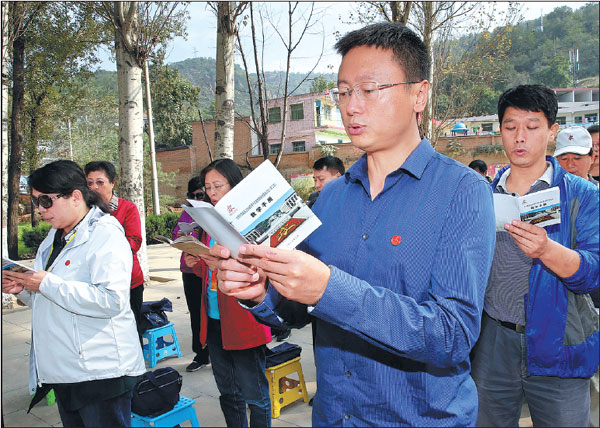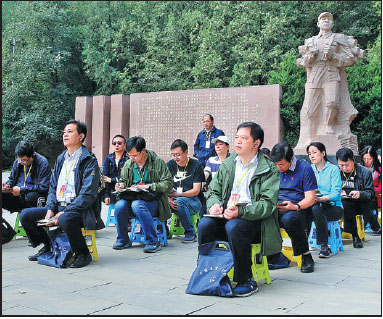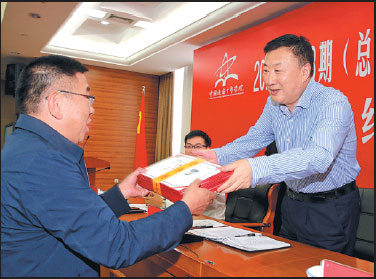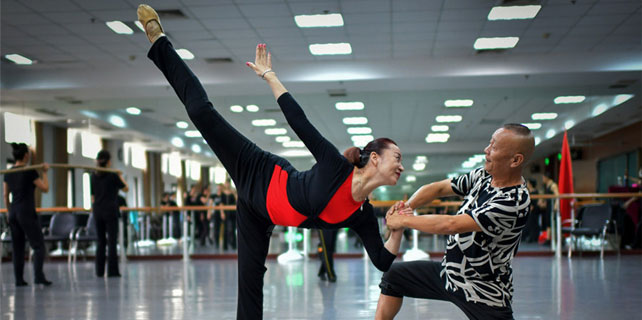'Revolution's cradle' nurtures new talents
A Party school in rural China continues to provide inspiration for cadres, as Luo Wangshu reports from Yan'an, Shaanxi.
The China Executive Leadership Academy in Yan'an, Shaanxi province - the scene of some of the Communist Party of China's earliest revolutionary activities - offers officials "red" education to reinforce their loyalty to the Party, and improve and strengthen the spirit of cadres to ensure good governance.
In September, when the semester starts, officials from across the country arrive to study Party theory and education at the academy, a national-level Party school. The curriculum includes Party history, Party building and Party discipline.
From 1935 to 1948, the CPC lived and fought in Yan'an. The period created the "Yan'an spirit", which emphasizes several qualities, including adherence to the correct political direction, the liberation of thought, seeking truth, self-reliance and serving the people.
Since it opened in 2005, the academy has specialized in "Party spirit education" that helps officials remain disciplined and determined to perform their duties with great passion.
"The academy uses historical resources as unique advantages for research, writing textbooks and holding classes at historic sites," said Li Guoxi, the academy's executive vice-president.
Powerful alumni
There are 2,900 Party schools in China. The Yan'an academy is one of four national-level establishments established directly by the CPC Central Committee. The others are in Beijing, Shanghai and Jinggangshan, Jiangxi province.
The world's best universities have a common goal - to nurture future leaders - but no Chinese school has as many powerful alumni as the four national Party schools.
By the end of last year, the Party had about 89 million members, according to the latest figures from the CPC Central Committee's organization department. However, not every member has the chance to study at Yan'an.
Most of the academy's students are at the level of Party department and bureau chief, from municipal officials to departmental directors in central ministries. Alternatively, the students are executives at State-owned companies, professionals or army officers.
They all play significant roles in China's cadre system, but in recent years officials at the county level have also been included as part of concerted attempts to pay more attention to grassroots cadres.
The training of CPC officials has been a tradition for many years, and in the 1930s and 1940s there were more than 20 Party schools in Yan'an.
"During the preliminary phase of the War of Resistance Against Japanese Aggression (1931-45), tens of thousands of patriotic young people wanted to fight for the country, so many schools were established to train them," said a member of the academy's staff, who preferred not to be named. "The schools turned out a lot of cadres for future victories."
Since it opened on March 21, 2005, the Yan'an academy has trained about 77,200 Party members and held more than 1,550 training sessions, according to the academy's figures.
The students eat at canteens and live on campus. They sleep in 15-square-meter rooms that contain a single bed, a private bathroom, a desk, a TV and a shelf of "red books", ranging from Mao Zedong Thought to the speeches of President Xi Jinping.
Cadres, faculty and staff are encouraged to wear badges on campus to reinforce their "red" identities.
'Experience' classes
Like the three other national-level Party schools, the academy uses local historical resources to provide cadres with a "vivid" history of the CPC in its area.
Cadres attend courses lasting one to four weeks, depending on the program they have selected. The courses include reviewing their initial reasons for joining the Party, analyzing the thoughts and speeches of the top leaders, Marxist theory, Party history and undertaking "experience lessons" at historic sites.
"Party members come to Yan'an to seek their roots and inherit the 'red gene'. Yan'an has 'materialized' history. Historic sites, such as the hall used to hold early Party Congress meetings and the cave in which Mao Zedong lived, are not simply materialized history, but the CPC's spiritual indicator. The students can better absorb and inherit the sacred spirit of these historic sites," said Cao Kun, a professor at the academy.
He described how he took his class to the hall that was used to hold the sixth Party Congress. The cadres visited an exhibition that described the events at the meeting and then two of the teachers delivered lectures on related themes. Finally, the students shared their thoughts about the events described. "The students can feel and imagine what really happened here," Cao said.
'Red' education
Classes usually start at 8:30 or 9 am and end at 5:30 or 6 pm. The curriculum consists of lectures, experience classes at historic sites and museum visits.
Although cadres can leave campus after class, they are encouraged to return by 10 pm. Outsiders are not allowed on campus without special approval.
However, most cadres do not leave campus unless they go on official outings, such as visiting museums, picking corn in the fields or taking experience lessons. The campus has virtually everything they need, including a bookstore, a tea house, a clinic, a gym and a supermarket.
The 17.3 hectare, pine-lined campus can accommodate 400 students at a time.
Many cadres walk or jog in the mornings and evenings. In class, males usually wear identical white shirts and black jackets - as if ordered from the same tailor - while the dress code for females is more diverse, ranging from formal suits to casual business skirts, but all show some degree of elegance.
"The training courses offer students the chance to consolidate their beliefs," said Jin Ming, the academy's vice-president.
The diverse range of lessons put forward by top Party leaders help to reinforce and shape the students' thoughts and regulate their behavior.
"The common core of my lessons is to improve the students' Party spirit," said Wang Tao, a professor at the academy.
The 37-year-old, who holds a doctorate, hopes that the training will help the students gain a deeper understanding of the Party's difficult early days and cherish the improvements they enjoy today.
"Every political party has its focus. The CPC emphasizes ideological education - without that, officials may forget the Party's mission to serve the people," he said.
Wang Zhi, an associate professor at the academy, said vigilance is essential to drive the message home.
"Officials should be repeatedly reminded of how CPC members should look at the world and the aims of the CPC. That's spiritual education," he said.
The 34-year-old associate professor, who holds a doctorate in Marxist philosophy, recalled the first time he taught a group of senior Party leaders.
"I was a little nervous at first, but I quickly recovered my composure. I was confident about my lesson plan, which I had spent two months preparing. It was my strength because it combined philosophy and Party history," he said.
"The students may excel in other aspects, such as practical experience, but in my class, I can handle them. I'm confident about that."
The end result
After the training, the cadres' thoughts are more in line with those of the Party leadership. Moreover, their awareness of being a Party member and their grasp of ideology are firmer and stronger.
Chen Yongxiang, deputy director of Yushu Tibetan autonomous prefecture, Qinghai province, said his belief in Communism is stronger after the course because the things he learned made it clear that only the CPC can develop China.
"I was moved while visiting the historic sites. The early CPC members endured such hard conditions almost beyond one's imagination. I had read about it in books, but seeing it with my own eyes was so impressive," he said.
Ding Linjie, deputy head of the Changjiang Waterway Bureau, Hubei province, said the training had given him a deeper understanding and appreciation of the president's thoughts.
"Before coming here, I studied a speech Xi gave on July 26 more than 10 times, and understood some of the values he expounded. But after hearing the teachers' analysis, I was enlightened. Their understanding is so precise and deep," he said, adding that he would pass that understanding on to his colleagues when he returned to work.
Contact the writer at luowangshu@chinadaily.com.cn
|
Cadres from Beijing's Xicheng district read the curriculum at the China Executive Leadership Academy in Yan'an.Photos By Huo Yan / China Daily |
|
Cadres take a lesson at a historic site.Huo Yan/china Daily |
|
Zhao Yaohong, vice-president of the China Executive Leadership Academy presents course certificates to cadres.Huo Yan/china Daily |



















